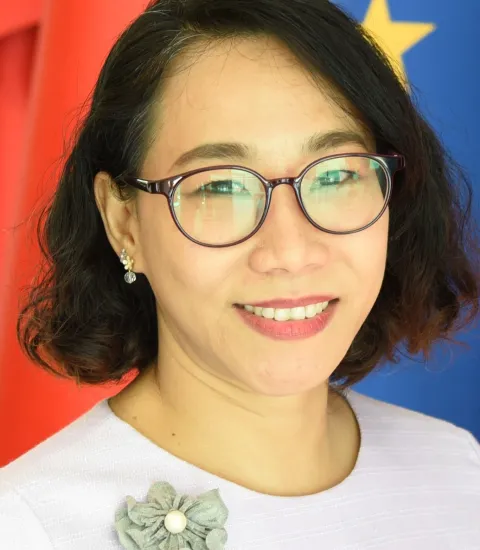
How can “Volunteerism” robustly contribute to Sustainable Development in Thailand?
About the author:
Ms. Ek-on Khunacharoen is the Deputy Director-General of the Department of International Organizations, Ministry of Foreign Affairs of Thailand.
In her commentary, Ms. Ek-on Khunacharoen discusses the contribution of “Volunteerism to Sustainable Development” as Thailand is gearing up towards the achievement of the Sustainable Development Goals (SDGs) in the Decade of Action:
Volunteer work is an important part of Thailand’s development efforts, and in ensuring that no one is left behind. Volunteerism is centered on individuals, both as drivers and beneficiaries of development.
The ongoing COVID-19 pandemic has significantly impeded economic growth and development efforts. It poses challenges not only to individuals, but also to communities and the country as a whole. As a result, the Government places great emphasis on ensuring more balanced growth and sustainable development pathways. Thailand aims to build more awareness of the SDGs both locally and nationally, as the ultimate goals to be achieved and the means towards building back better and more resilient. Ownership of the SDG process is key. Participation from the people is therefore an important tool to drive the country’s efforts towards the achievement of the SDGs.
In 2020, a challenging year for all countries due to the COVID-19 crisis, Thailand published its Voluntary National Review on the Implementation of the 2030 Agenda for Sustainable Development under the theme “Volunteerism and Sustainable Development”. It highlighted good examples of how volunteer work can drive the SDGs, especially in this time of crisis when the world is embracing the “New” and “Next Normal”. Indeed, the role of volunteers in Thailand’s fight against the COVID-19 pandemic has been recognized worldwide.
For us Thais, “volunteerism” is not merely about the action, but also the spirit in which the action is being taken. This spirit of volunteerism has a unique power to inspire and empower the hearts and souls of the people. “Volunteerism” does not discriminate. Every person can and does have a role to play.
Giving and volunteering has become a notable source of pride for Thailand. With over 13 million volunteers advocating for different noble causes since 2011, our volunteers play a crucial role in advancing the SDGs on the ground, particularly through increasing the reach of SDG-related services to the people who are most in need. Not only can volunteers help translate government policies into concrete action, but they can become a channel for the people to voice their opinions and feedbacks on those policies, which helps improve policy implementation while also strengthening the bonds between individuals and their communities.
“As we build back from the crisis, international cooperation is more crucial than ever[1]”. Thailand has in place the “Friends from Thailand (FFT) project”, which is overseen and managed by the Thailand International Cooperation Agency (TICA). Since 2003, TICA has dispatched Thai volunteers to neighbouring countries in the Mekong region (e.g., Cambodia, Lao PDR, Myanmar, and Vietnam) and beyond (e.g. Bhutan, Sri Lanka, Timor-Leste, Benin, Mozambique, and Lesotho). For instance, at the beginning of the COVID-19 pandemic, FFT volunteers worked in a COVID-19 lab to help Bhutanese fight against the pandemic. In Benin, they worked with local farmers to make natural pesticide from wood vinegar and helped them set up an agricultural development center. Utilising the home-grown development model, the “Sufficiency Economic Philosophy (SEP)”, Thailand has been able to share its experiences and pathway towards achieving the SDGs and sustainable development in a more balanced manner. The SEP’s three pillars of moderation, reason, and resilience, together with the twin prerequisites of virtue and knowledge, provide a flexible theoretical framework for attaining sustainable development in various circumstances based on each country’s context.
Volunteerism has also been very much embraced by the private sector and civil society, thereby enhancing the volunteer network’s coverage in the country.
The Government’s effort in expanding the country’s network of development partners aims to speed up the progress towards the SDGs. This effort focuses on forging collaboration among various stakeholders be they youth, civil society, private sector, academia or volunteers, and raising public knowledge of the SDGs so that all can engage in the development process in a comprehensive and effective manner. With this multi-stakeholder approach, Thailand looks forward to rebuilding its economy and society to become more prepared for future risks as we drive forward a more balanced and sustainable growth.
The year 2022 marks the seventh year since the adoption of the 2030 Agenda. With the 2030 deadline, we have less than 10 years to accomplish the SDGs. Thailand is more committed than ever to continue its close collaboration with the UN Volunteers (UNV) Programme and other development partners towards this endeavour.
We strongly believe that volunteerism and the sustainable development nexus will continue to motivate and inspire individuals worldwide. More importantly, it has the potential to bring about the much needed long-term and transformative change.
Click here to view a video of Thailand’s Volunteerism and Sustainable Development.
The electronic version of the 2020 edition of Thailand’s VNR is available at https://sep4sdgs.mfa.go.th/.
[1] Reference: https://www.unescap.org/taxonomy/term/266



